Analysis of Project Management Methodologies: Agile, Waterfall & PLC
VerifiedAdded on 2023/06/10
|6
|1148
|105
Report
AI Summary
This report provides an overview of project management methodologies, focusing on Agile and Waterfall approaches. It defines methodology as a structured framework for planning, structuring, and tracking project activities. The report highlights the role of methodologies in identifying time and cost, supporting decision-making, mentoring progress, defining project scope, and handling risks. It compares and contrasts the Waterfall and Agile methodologies, noting their similarities in basic processes and role sharing, but differing in their suitability for different project complexities and flexibility in accommodating changes. The report also discusses the relation of Waterfall and Agile methodologies to the Project Life Cycle (PLC), emphasizing how both methodologies align with the phases of conceptualizing, planning, executing, and terminating a project. This document is available on Desklib, where students can find a variety of solved assignments and study resources.
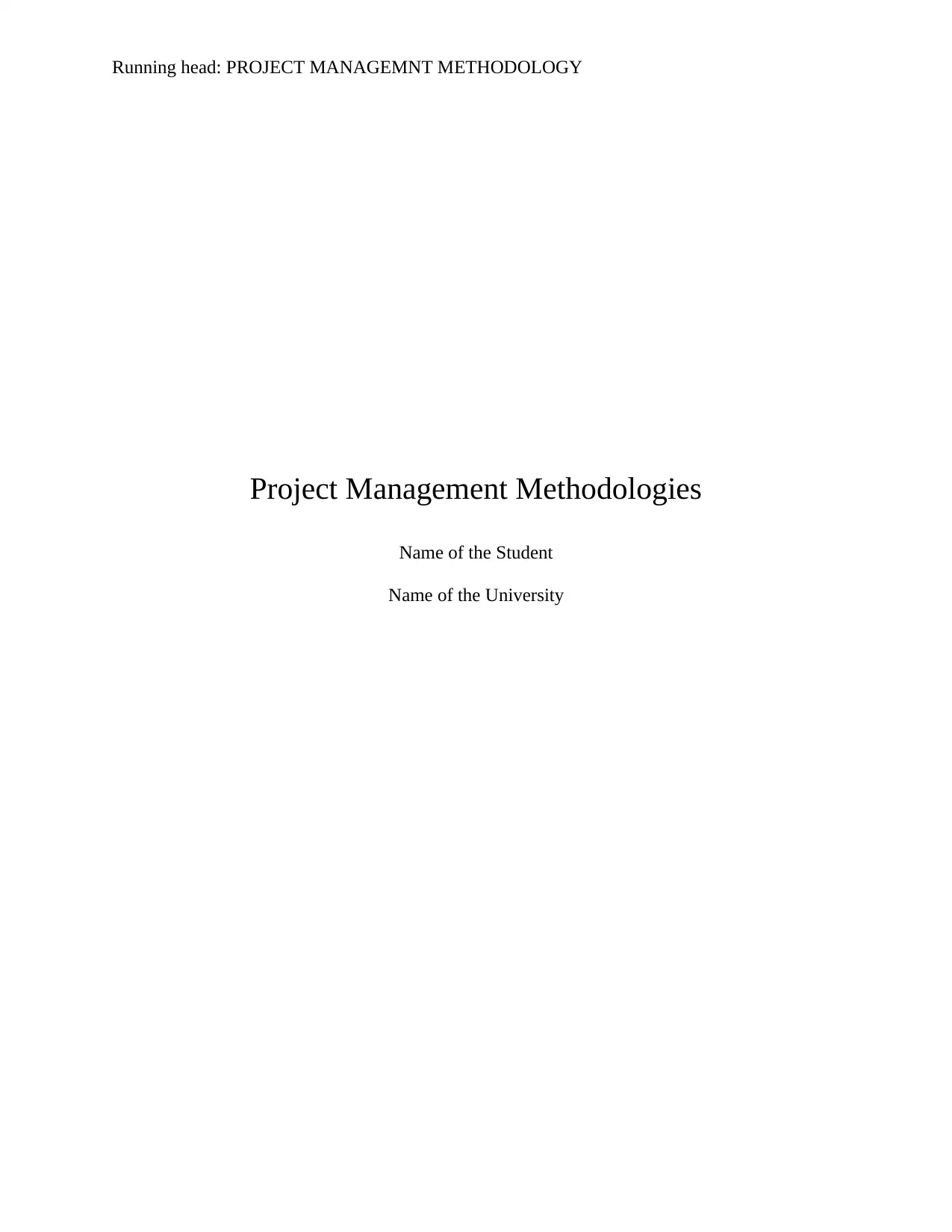
Running head: PROJECT MANAGEMNT METHODOLOGY
Project Management Methodologies
Name of the Student
Name of the University
Project Management Methodologies
Name of the Student
Name of the University
Paraphrase This Document
Need a fresh take? Get an instant paraphrase of this document with our AI Paraphraser
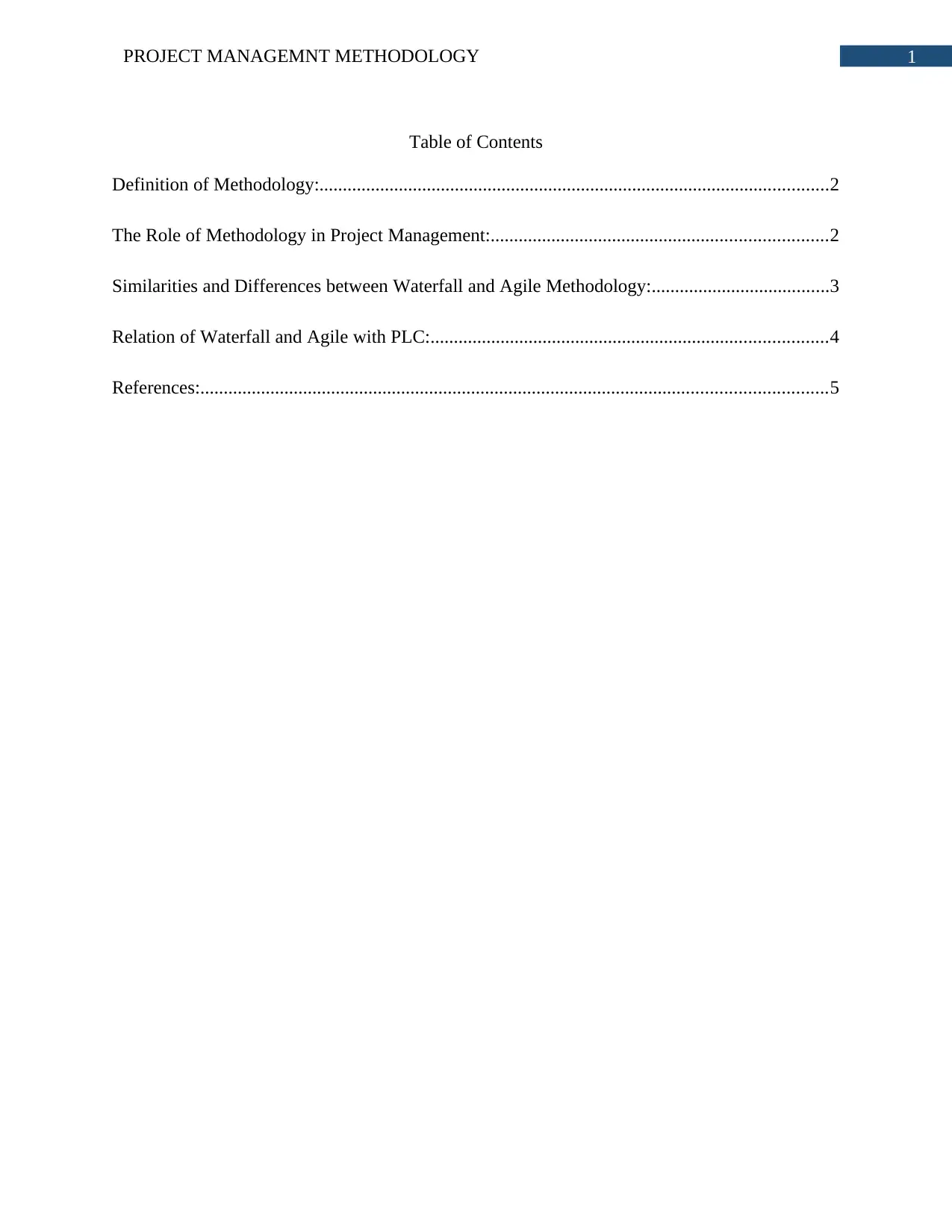
1PROJECT MANAGEMNT METHODOLOGY
Table of Contents
Definition of Methodology:.............................................................................................................2
The Role of Methodology in Project Management:........................................................................2
Similarities and Differences between Waterfall and Agile Methodology:......................................3
Relation of Waterfall and Agile with PLC:.....................................................................................4
References:......................................................................................................................................5
Table of Contents
Definition of Methodology:.............................................................................................................2
The Role of Methodology in Project Management:........................................................................2
Similarities and Differences between Waterfall and Agile Methodology:......................................3
Relation of Waterfall and Agile with PLC:.....................................................................................4
References:......................................................................................................................................5
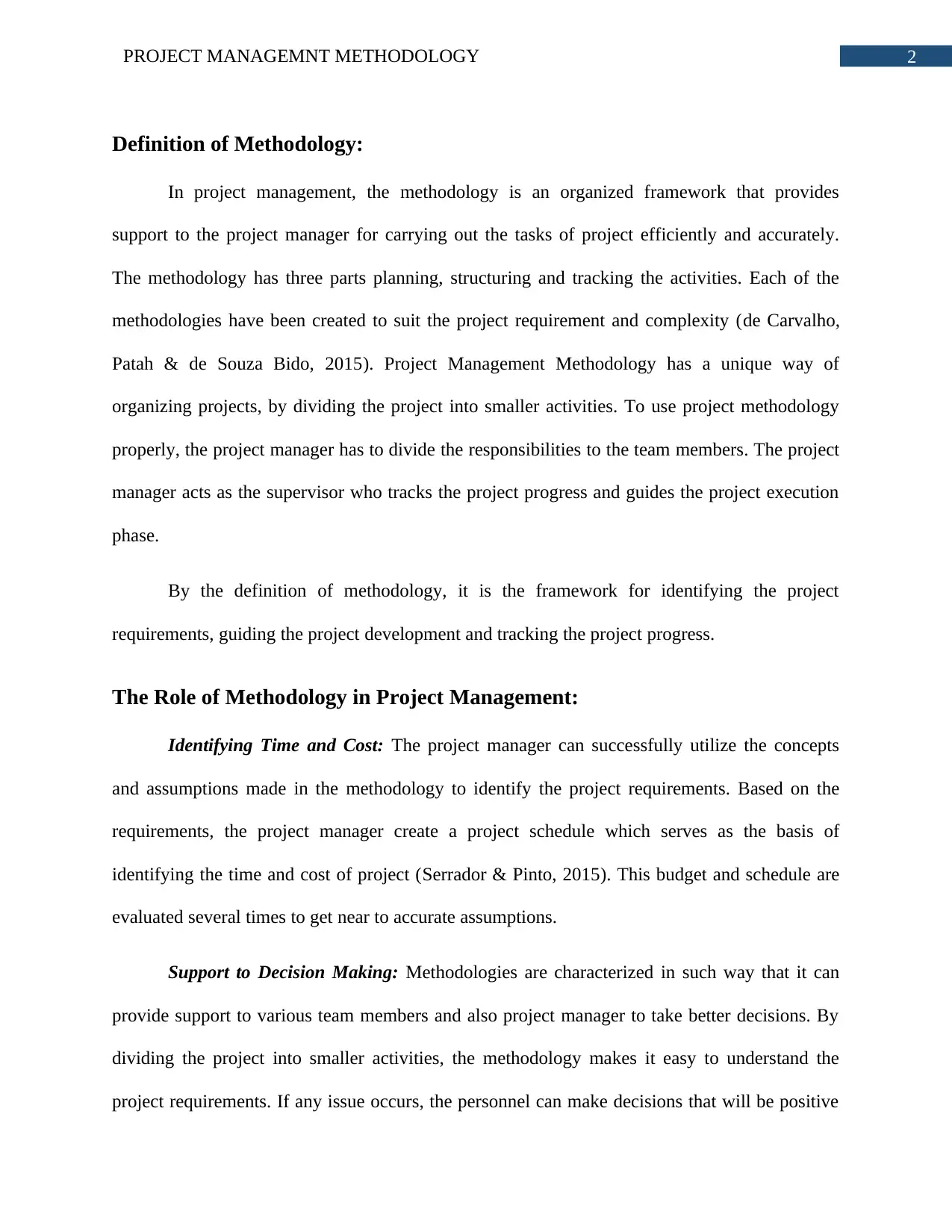
2PROJECT MANAGEMNT METHODOLOGY
Definition of Methodology:
In project management, the methodology is an organized framework that provides
support to the project manager for carrying out the tasks of project efficiently and accurately.
The methodology has three parts planning, structuring and tracking the activities. Each of the
methodologies have been created to suit the project requirement and complexity (de Carvalho,
Patah & de Souza Bido, 2015). Project Management Methodology has a unique way of
organizing projects, by dividing the project into smaller activities. To use project methodology
properly, the project manager has to divide the responsibilities to the team members. The project
manager acts as the supervisor who tracks the project progress and guides the project execution
phase.
By the definition of methodology, it is the framework for identifying the project
requirements, guiding the project development and tracking the project progress.
The Role of Methodology in Project Management:
Identifying Time and Cost: The project manager can successfully utilize the concepts
and assumptions made in the methodology to identify the project requirements. Based on the
requirements, the project manager create a project schedule which serves as the basis of
identifying the time and cost of project (Serrador & Pinto, 2015). This budget and schedule are
evaluated several times to get near to accurate assumptions.
Support to Decision Making: Methodologies are characterized in such way that it can
provide support to various team members and also project manager to take better decisions. By
dividing the project into smaller activities, the methodology makes it easy to understand the
project requirements. If any issue occurs, the personnel can make decisions that will be positive
Definition of Methodology:
In project management, the methodology is an organized framework that provides
support to the project manager for carrying out the tasks of project efficiently and accurately.
The methodology has three parts planning, structuring and tracking the activities. Each of the
methodologies have been created to suit the project requirement and complexity (de Carvalho,
Patah & de Souza Bido, 2015). Project Management Methodology has a unique way of
organizing projects, by dividing the project into smaller activities. To use project methodology
properly, the project manager has to divide the responsibilities to the team members. The project
manager acts as the supervisor who tracks the project progress and guides the project execution
phase.
By the definition of methodology, it is the framework for identifying the project
requirements, guiding the project development and tracking the project progress.
The Role of Methodology in Project Management:
Identifying Time and Cost: The project manager can successfully utilize the concepts
and assumptions made in the methodology to identify the project requirements. Based on the
requirements, the project manager create a project schedule which serves as the basis of
identifying the time and cost of project (Serrador & Pinto, 2015). This budget and schedule are
evaluated several times to get near to accurate assumptions.
Support to Decision Making: Methodologies are characterized in such way that it can
provide support to various team members and also project manager to take better decisions. By
dividing the project into smaller activities, the methodology makes it easy to understand the
project requirements. If any issue occurs, the personnel can make decisions that will be positive
⊘ This is a preview!⊘
Do you want full access?
Subscribe today to unlock all pages.

Trusted by 1+ million students worldwide
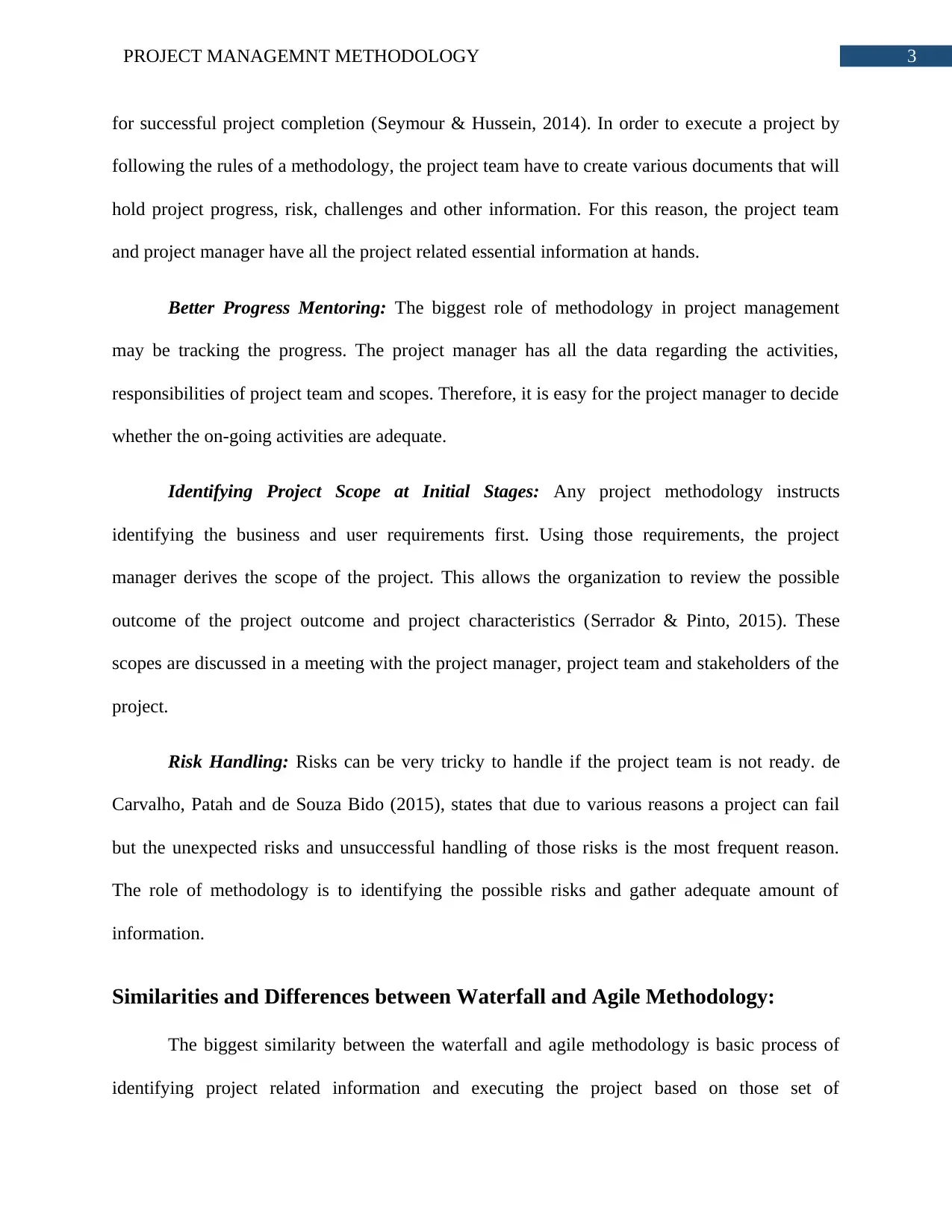
3PROJECT MANAGEMNT METHODOLOGY
for successful project completion (Seymour & Hussein, 2014). In order to execute a project by
following the rules of a methodology, the project team have to create various documents that will
hold project progress, risk, challenges and other information. For this reason, the project team
and project manager have all the project related essential information at hands.
Better Progress Mentoring: The biggest role of methodology in project management
may be tracking the progress. The project manager has all the data regarding the activities,
responsibilities of project team and scopes. Therefore, it is easy for the project manager to decide
whether the on-going activities are adequate.
Identifying Project Scope at Initial Stages: Any project methodology instructs
identifying the business and user requirements first. Using those requirements, the project
manager derives the scope of the project. This allows the organization to review the possible
outcome of the project outcome and project characteristics (Serrador & Pinto, 2015). These
scopes are discussed in a meeting with the project manager, project team and stakeholders of the
project.
Risk Handling: Risks can be very tricky to handle if the project team is not ready. de
Carvalho, Patah and de Souza Bido (2015), states that due to various reasons a project can fail
but the unexpected risks and unsuccessful handling of those risks is the most frequent reason.
The role of methodology is to identifying the possible risks and gather adequate amount of
information.
Similarities and Differences between Waterfall and Agile Methodology:
The biggest similarity between the waterfall and agile methodology is basic process of
identifying project related information and executing the project based on those set of
for successful project completion (Seymour & Hussein, 2014). In order to execute a project by
following the rules of a methodology, the project team have to create various documents that will
hold project progress, risk, challenges and other information. For this reason, the project team
and project manager have all the project related essential information at hands.
Better Progress Mentoring: The biggest role of methodology in project management
may be tracking the progress. The project manager has all the data regarding the activities,
responsibilities of project team and scopes. Therefore, it is easy for the project manager to decide
whether the on-going activities are adequate.
Identifying Project Scope at Initial Stages: Any project methodology instructs
identifying the business and user requirements first. Using those requirements, the project
manager derives the scope of the project. This allows the organization to review the possible
outcome of the project outcome and project characteristics (Serrador & Pinto, 2015). These
scopes are discussed in a meeting with the project manager, project team and stakeholders of the
project.
Risk Handling: Risks can be very tricky to handle if the project team is not ready. de
Carvalho, Patah and de Souza Bido (2015), states that due to various reasons a project can fail
but the unexpected risks and unsuccessful handling of those risks is the most frequent reason.
The role of methodology is to identifying the possible risks and gather adequate amount of
information.
Similarities and Differences between Waterfall and Agile Methodology:
The biggest similarity between the waterfall and agile methodology is basic process of
identifying project related information and executing the project based on those set of
Paraphrase This Document
Need a fresh take? Get an instant paraphrase of this document with our AI Paraphraser
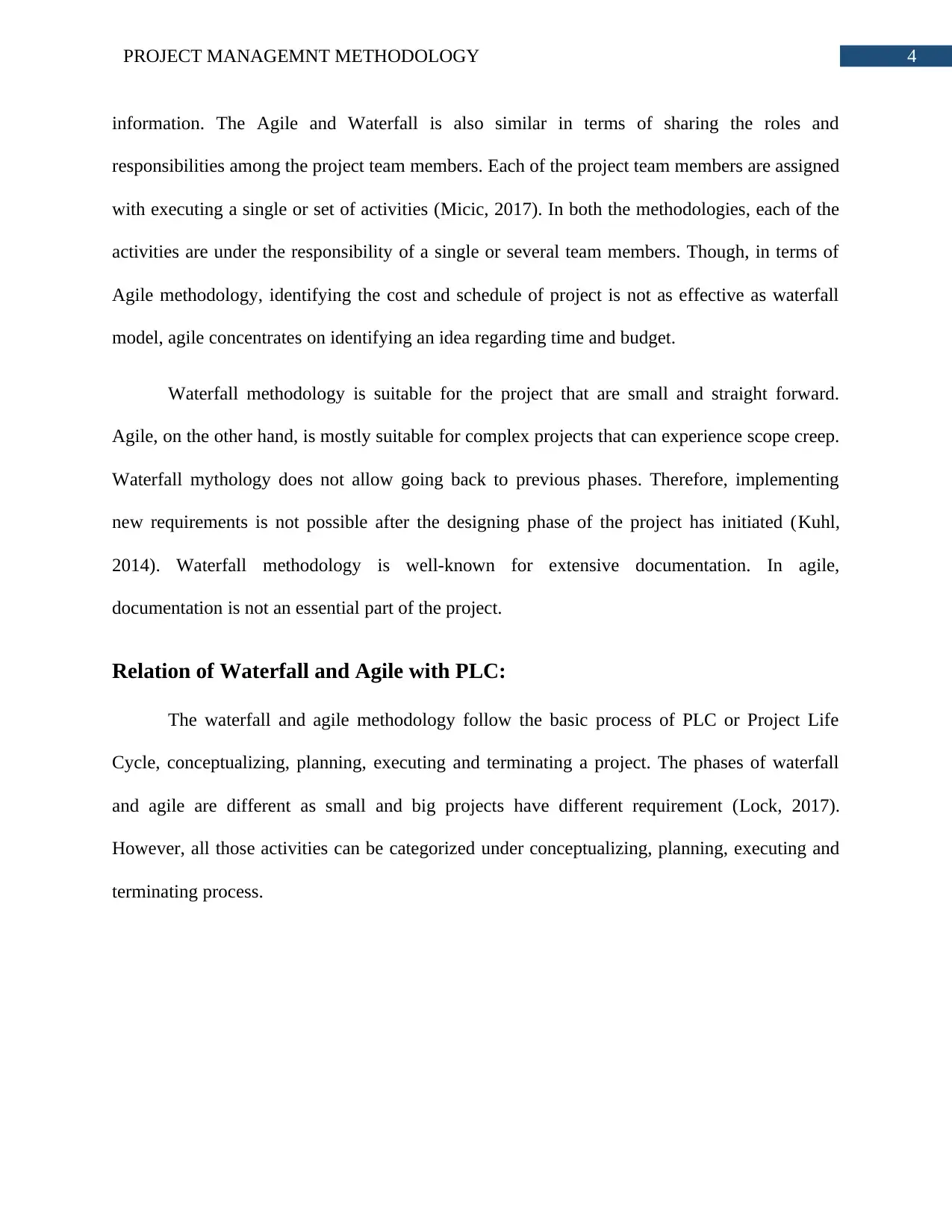
4PROJECT MANAGEMNT METHODOLOGY
information. The Agile and Waterfall is also similar in terms of sharing the roles and
responsibilities among the project team members. Each of the project team members are assigned
with executing a single or set of activities (Micic, 2017). In both the methodologies, each of the
activities are under the responsibility of a single or several team members. Though, in terms of
Agile methodology, identifying the cost and schedule of project is not as effective as waterfall
model, agile concentrates on identifying an idea regarding time and budget.
Waterfall methodology is suitable for the project that are small and straight forward.
Agile, on the other hand, is mostly suitable for complex projects that can experience scope creep.
Waterfall mythology does not allow going back to previous phases. Therefore, implementing
new requirements is not possible after the designing phase of the project has initiated (Kuhl,
2014). Waterfall methodology is well-known for extensive documentation. In agile,
documentation is not an essential part of the project.
Relation of Waterfall and Agile with PLC:
The waterfall and agile methodology follow the basic process of PLC or Project Life
Cycle, conceptualizing, planning, executing and terminating a project. The phases of waterfall
and agile are different as small and big projects have different requirement (Lock, 2017).
However, all those activities can be categorized under conceptualizing, planning, executing and
terminating process.
information. The Agile and Waterfall is also similar in terms of sharing the roles and
responsibilities among the project team members. Each of the project team members are assigned
with executing a single or set of activities (Micic, 2017). In both the methodologies, each of the
activities are under the responsibility of a single or several team members. Though, in terms of
Agile methodology, identifying the cost and schedule of project is not as effective as waterfall
model, agile concentrates on identifying an idea regarding time and budget.
Waterfall methodology is suitable for the project that are small and straight forward.
Agile, on the other hand, is mostly suitable for complex projects that can experience scope creep.
Waterfall mythology does not allow going back to previous phases. Therefore, implementing
new requirements is not possible after the designing phase of the project has initiated (Kuhl,
2014). Waterfall methodology is well-known for extensive documentation. In agile,
documentation is not an essential part of the project.
Relation of Waterfall and Agile with PLC:
The waterfall and agile methodology follow the basic process of PLC or Project Life
Cycle, conceptualizing, planning, executing and terminating a project. The phases of waterfall
and agile are different as small and big projects have different requirement (Lock, 2017).
However, all those activities can be categorized under conceptualizing, planning, executing and
terminating process.
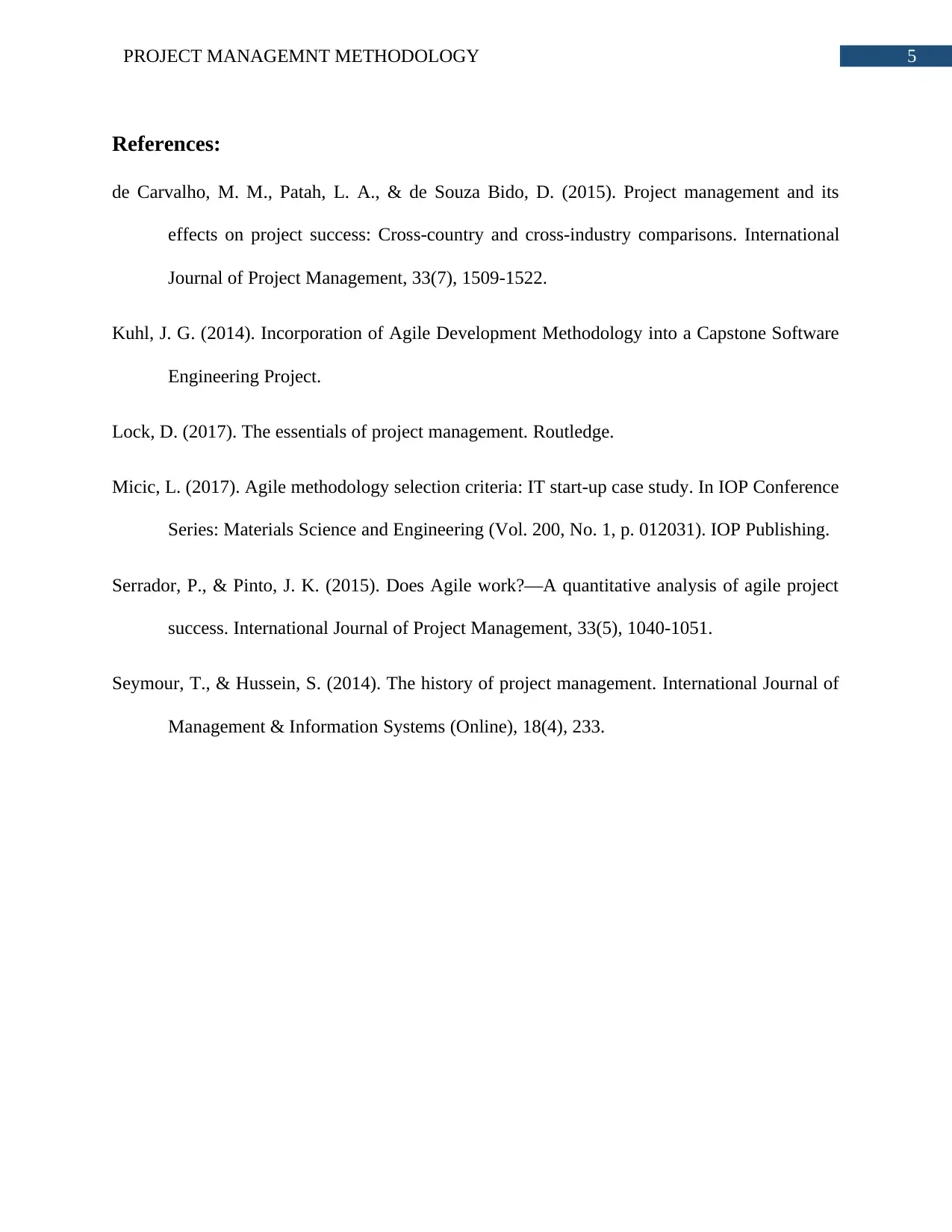
5PROJECT MANAGEMNT METHODOLOGY
References:
de Carvalho, M. M., Patah, L. A., & de Souza Bido, D. (2015). Project management and its
effects on project success: Cross-country and cross-industry comparisons. International
Journal of Project Management, 33(7), 1509-1522.
Kuhl, J. G. (2014). Incorporation of Agile Development Methodology into a Capstone Software
Engineering Project.
Lock, D. (2017). The essentials of project management. Routledge.
Micic, L. (2017). Agile methodology selection criteria: IT start-up case study. In IOP Conference
Series: Materials Science and Engineering (Vol. 200, No. 1, p. 012031). IOP Publishing.
Serrador, P., & Pinto, J. K. (2015). Does Agile work?—A quantitative analysis of agile project
success. International Journal of Project Management, 33(5), 1040-1051.
Seymour, T., & Hussein, S. (2014). The history of project management. International Journal of
Management & Information Systems (Online), 18(4), 233.
References:
de Carvalho, M. M., Patah, L. A., & de Souza Bido, D. (2015). Project management and its
effects on project success: Cross-country and cross-industry comparisons. International
Journal of Project Management, 33(7), 1509-1522.
Kuhl, J. G. (2014). Incorporation of Agile Development Methodology into a Capstone Software
Engineering Project.
Lock, D. (2017). The essentials of project management. Routledge.
Micic, L. (2017). Agile methodology selection criteria: IT start-up case study. In IOP Conference
Series: Materials Science and Engineering (Vol. 200, No. 1, p. 012031). IOP Publishing.
Serrador, P., & Pinto, J. K. (2015). Does Agile work?—A quantitative analysis of agile project
success. International Journal of Project Management, 33(5), 1040-1051.
Seymour, T., & Hussein, S. (2014). The history of project management. International Journal of
Management & Information Systems (Online), 18(4), 233.
⊘ This is a preview!⊘
Do you want full access?
Subscribe today to unlock all pages.

Trusted by 1+ million students worldwide
1 out of 6
Related Documents
Your All-in-One AI-Powered Toolkit for Academic Success.
+13062052269
info@desklib.com
Available 24*7 on WhatsApp / Email
![[object Object]](/_next/static/media/star-bottom.7253800d.svg)
Unlock your academic potential
Copyright © 2020–2026 A2Z Services. All Rights Reserved. Developed and managed by ZUCOL.



